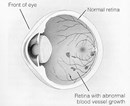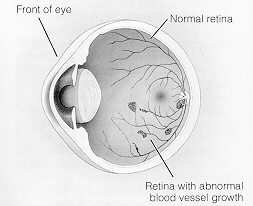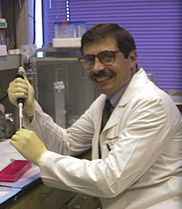Scientists Identify Natural Chemical That Causes Blinding Blood Vessel Growth

Results are reported in the February, 2000 issue of the American Journal of Pathology.
VEGF is released by the retina when normal retinal blood vessels are damaged by disease, causing an oxygen deficiency. VEGF turns on its receptor, a switch that ignites a chain reaction culminating in new blood vessel growth. However, these backup blood vessels are faulty: They leak, bleed, and encourage scar tissue that detaches the retina, resulting in severe loss of vision. Such growth is the hallmark of diabetic retinopathy, the leading cause of blindness in young people in developed countries.

Diabetic retinopathy begins with abnormal blood
vessel growth. Vessels leak or cause retinal
detachment, leading to blindness.
Several factors in addition to VEGF have been thought to contribute to abnormal blood vessel growth, so finding that blocking the receptor for VEGF is enough to stop the bloos vessel growth "is a pleasant surprise that bodes well for drug treatment of the process," says Peter A. Campochiaro, senior author of the study and a professor of ophthalmology and neuroscience at Hopkins.
"Despite evidence that multiple substances are involved in the creation of abnormal blood vessels in the retina, we now know that stopping one of them, VEGF, is enough to completely block the process," Campochiaro added. "By designing drugs that specifically block VEGF receptors, it should be possible to stop abnormal blood vessel growth with fewer side effects."
In addition to causing growth of abnormal blood vessels, VEGF also causes normal blood vessels to become leaky. This leakiness underlies macular edema, another major cause of vision loss in diabetic patients. Macular edema occurs when fluid leaks out of vessels, resulting in thickening and distortion of the retina.

Peter A. Campochiaro
Clinical studies to determine if one of the drugs, called PKC 412, can stop abnormal blood vessel growth and prevent macular edema in patients with diabetic retinopathy are planned for April or May at Hopkins' Wilmer Eye Institute. A different type of abnormal blood vessel growth occurs in macular degeneration. Current studies are evaluating whether VEGF also plays a role in that process.
For more information: Peter A. Campochiaro, Johns Hopkins Hospital School of Medicine, Wilmer Ophthalmological Institute, Maumenee 815, 600 North Wolfe St., Baltimore, MD 21287-9277. Tel:410-955-4103. Fax: 410-502-5382.
Angelo DePalma
